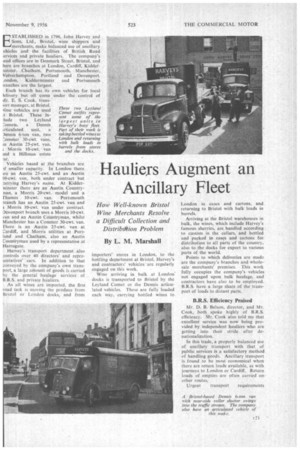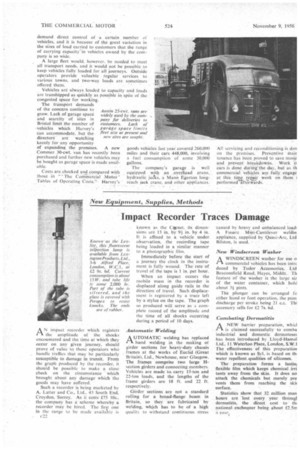Hauliers Augment an Ancillary Fleet
Page 59

Page 60

If you've noticed an error in this article please click here to report it so we can fix it.
How Well-known Bristol Wine Merchants Resolve a Difficult Collection and DistribiRion Problem By L. M. Marshall
importers' stores in London, to the bottling department at Bristol. Harvey's and contractors' vehicles are regularly engaged on this work.
Wine arriving in bulk at London docks is transported to Bristol by the Leyland Comet or the Dennis articulated vehicles. These are fully loaded each way, carrying bottled wines to. London in cases and cartons, and returning to Bristol with bulk loads in barrels.
Arriving at the Bristol warehouses in bulk, the wines, which include Harvey's famous sherries, are handled according to custom in the cellars, and bottled and 'packed in eases and cartons for distribution to all parts of the country, also to the docks for export to various parts of the world.
Points to which deliveries are made are the company's branches and wholesale merchants' premises. This work fully occupies the company's vehicles not engaged upon bulk haulage, and contractors have also to be employed. B.R.S. have a large share of the transport of loads to distant parts.
B.R.S. Efficiency Praised
Mr. D. B. Belson, director, and Mr. Cook, both spoke highly of B.R.S. efficiency. Mr. Cook also told me that excellent service was now being provided by independent hauliers who are getting into their stride after denationalization.
In this trade, a properly balanced use of ancillary transport with that of public services is a satisfactory method of handling goods. Ancillary transport is found to be most economical when there are return loads available, as with journeys to London or Cardiff. Return loads of empties are often carried on other routes.
Urgent transport requirements demand direct control of a certain number ol vehicles, and it is because of the great variation in the sizes of load carried to customers that the range of carrying capacity' in vehicles owned by the company is so wide.
A large fleet would, however, be needed to meet all transport needs, and it would not be possible to keep vehicles fully loaded for all journeys. Outside operators provide valuable regular services to various towns, and two-way loads arc sometimes offered them.
Vehicles aro always loaded to capacity and loads are transhipped as quickly as possible in spite of the congested space for working.
The transport demands of the concern continue to grow. Lack of garage space and scarcity of sites in Bristol lirhit the number of ,vehicles which Harvey's can accommodate, but the directors are watching keenly for any opportunity of expanding the premises. A new Commer 30-cwt. van has recently been purchased and further new vehicles may be bought as garage space is made available.
Costs are checked and compared with those in " The Coriimercial Motor' Tables of Operating Costs.' '• Harvey's
goods vehicles last N ea r covered 260.000 miles and their cars 448,000. involving a fuel consumption of some 30,000 gallons.
The company's garage is well equipped with an . overhead crane:. hydraulic jacli, a Mann Egerton longreach jack crane, and. other appliances. All servicing and reconditioning is don on the premises. Preventive mair tenance has been proved to save mone and prevent breakdowns. Work o cars is done during the day, but as th commercial vehicles are fully engage at this time repair work on them i
, ,
performed aNao,fterwards.




























































































































